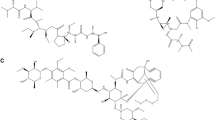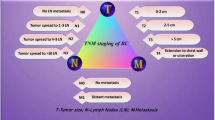Abstract
Purpose
Epidemiological studies have suggested that intake of soy isoflavones is associated with a reduced risk of development of breast cancer and an improved prognosis in patients with breast cancer. In addition, basic research has demonstrated the antitumor effects of these compounds on breast cancer cell lines. However, the detailed effects of the intake of equol, which is one of the metabolites of the soy isoflavones, are yet to be clarified on the risk of development and recurrence of breast cancer and its interactions with drugs used for treating breast cancer. This study aimed to determine the antitumor effects of equol and investigate the impact of adding equol to therapeutic agents for breast cancer using breast cancer cell lines.
Methods
We examined the antitumor effect of equol on breast cancer cell lines using MTS assay. We also studied the combined effect of equol and the existing hormonal or chemotherapeutic agents using combination index. We evaluated the expressions of the related proteins by Western blot analysis and correlated the findings with the antitumor effect.
Results
Equol showed bi-phasic protumor and antitumor effects; at a low concentration, it promoted the tumor growth in hormone receptor-positive cell lines, whereas antitumor effects were generally observed when an excessive amount of dose unexpected in the blood and the tissue was administered. When used with tamoxifen, equol might have some antagonistic effect, although it depends on equol concentration and the type of cancer cells.
Conclusions
We confirmed that equol has dual action, specifically a tumor growth-promoting effect and an antitumor effect. Although the results suggested that equol might exert an antagonistic effect against tamoxifen depending on the concentration, equol did not exert an antagonistic effect on other therapeutic agents.






Similar content being viewed by others
References
Uchiyama S (2015) New Insights into “Equol”, a novel ingredient derived from soy. Nippon Shokuhin Kagaku Kogaku Kaishi 62(7):356–363
Dong JY, Qin LQ (2011) Soy isoflavones consumption and risk of breast cancer incidence or recurrence: a meta-analysis of prospective studies. Breast Cancer Res Treat 125(2):315–323
Trock BJ, Hilakivi-Clarke L, Clarke R (2006) Meta-analysis of soy intake and breast cancer risk. J Natl Cancer Inst 98(7):459–471
Yamamoto S, Sobue T, Sasaki S, Shoichiro T (2003) Soy, isoflavones, and breast cancer risk in Japan. J Natl Cancer Inst 95(12):906–913
Guha N, Kwan ML, Quesenberry CP Jr, Weltzien EK, Castillo AL, Caan BJ (2009) Soy isoflavones and risk of cancer recurrence in a cohort of breast cancer survivors:the Life After Cancer Epidemiology study. Breast Cancer Res Treat 118(2):395–405
Kang X, Zhang Q, Wang S, Huang X, Jin S (2010) Effect of soy isoflavones on breast cancer recurrence and death for patients receiving adjuvant endocrine therapy. CMAJ 182(17):1857–1862
Caan BJ, Natarajan L, Parker B, Gold EB, Thomson C, Newman V et al (2011) Soy food consumption and breast cancer prognosis. Cancer Epidemiol Biomarkers Prev 20(5):854–858
Boyapati SM, Shu XO, Ruan ZX, Dai Q, Cai Q, Gao YT et al (2005) Soyfood intake and breast cancer survival:a followup of the Shanghai Breast Cancer Study. Breast Cancer Res Treat 92(1):11–17
Fink BN, Steck SE, Wolff MS, Britton JA, Kabat GC, Gaudet MM et al (2007) Dietary flavonoid intake and breast cancer survival among women on Long Island. Cancer Epidemiol Biomarkers Prev 16(11):2285–2292
Shu XO, Zheng Y, Cai H, Gu K, Chen Z, Zheng W et al (2009) Soy food intake and breast cancer survival. JAMA 302(22):2437–2443
Zhang YF, Kang HB, Li BL, Zhang RM (2012) Positive effects of soy isoflavone food on survival of breast cancer patients in China. Asian Pac J Cancer Prev 13(2):479–482
Conroy SM, Maskarinec G, Park SY, Wilkens LR, Henderson BE, Kolonel LN (2013) The effects of soy consumption before diagnosis on breast cancer survival:the Multiethnic Cohort Study. Nutr Cancer 65(4):527–537
Yuan J-P, Wang J-H, Liu X (2007) Metabolism of dietary soy isoflavones to equol by human intestinal microflora-implications for health. Mol Nutr Food Res 51:765–781
Yu-Cheng MG (1995) Metabolism of daidzein and genistein by intestinal bacteria. J Nat Prod 58(12):1892–1896
Setchell KDR, Brown NM, Lydeking-Olsen E (2002) The clinical importance of the metabolite equol-A clue to the effectiveness of soy and its isoflavones. J Nutr 132(12):3577–3584
Usui T (2006) Molecular and pharmacological analysis of genistein, daidzein and its metabolite equol, and their clinical significance. Soy Protein Res 9:153–157
Charalambous C, Pitta CA, Constantinou A (2013) Equol enhances tamoxifen's anti-tumor activity by induction of caspase-mediated apoptosis in MCF-7 breast cancer cells. BMC Cancer 13:238. https://doi.org/10.1186/1471-2407-13-238
Shi J et al (2011) Equol induced apoptosis of human breast cancer MDA-MB-231 cell by inhibiting the expression of nuclear factor-kappaB. Wei Sheng Yan jiu 40(1):95–98
Ikeda H, Taira N, Nogami T, Shien K, Okada M, Shien T, Doihara H, Miyoshi S (2011) Combination treatment with fulvestrant and various cytotoxic agents (doxorubicin, paclitaxel, docetaxel, vinorelbine, and 5-fluorouracil) has a synergistic effect in estrogen receptor-positive breast cancer. Cancer Sci 102(11):2038–2042
Higuchi T, Endo M, Hanamura T, Gohno T, Niwa T, Yamaguchi Y, Horiguchi J, Hayashi S (2016) Contribution of estrone sulfate to cell proliferation in aromatase inhibitor (AI)-resistant hormone receptor-positive breast cancer. PLoS ONE. https://doi.org/10.1371/journal.pone.0155844
Taira N, Doihara H, Oota T et al (2006) Gefitinib, an epidermal growth factor receptor blockade agent, shows additional or synergistic effects on the radiosensitivity of esophageal cancer cells in vitro. Acta Med Okayama 60:25–34
Kawasaki K, Watanabe M, Sakaguchi M et al (2009) REIC ⁄ Dkk-3 overexpression downregulates P-glycoprotein in multidrug-resistant MCF7 ⁄ ADR cells and induces apoptosis in breast cancer. Cancer Gene Ther 16:65–72
Treeck O, Juhasz-Boess I, Lattrich C, Horn F, Goerse R, Ortmann O (2008) Effects of exon-deleted estrogen receptor beta transcript variants on growth, apoptosis and gene expression of human breast cancer cell lines. Breast Cancer Res Treat 110(3):507–520
Treeck O, Lattrich C, Springwald A, Ortmann O (2010) Estrogen receptor beta exerts growth-inhibitory effects on human mammary epithelial cells. Breast Cancer Res Treat 120(3):557–565
Paruthiyil S, Parmar H, Kerekatte V, Cunha GR, Firestone GL, Leitman DC (2004) Estrogen receptor beta inhibits human breast cancer cell proliferation and tumor formation by causing a G2 cell cycle arrest. Cancer Res 64(1):423–428
Madhu Krishna B, Caudhary S, Mishra DR, Naik SK, Suklabaidya S, Adhya AK, Mishra SK (2018) Estrogen receptor α dependent regulation of estrogen related receptor β and its role in cell cycle in breast cancer. BMC Cancer 18:607. https://doi.org/10.1186/s12885-018-4528-x
Yuan B, Cheng L, Gupta K et al (2016) Tyrosine phosphorylation regulates ERβ ubiquitination, protein turnover, and inhibition of breast cancer. Oncotarget 7(27):42585–42597
Honma N, Horii R, Iwase T, Younes M, Takubo K, Matsuura M, Ito Y, Akiyama F, Sakamoto G (2008) Clinical importance of estrogen receptor-β evaluation in breast cancer patients treated with adjuvant tamoxifen therapy. JCO 26(22):3727–3734
Ak M, Abrahamsson A, Dabrosin C (2016) Fulvestrant inhibits growth of triple negative breast cancer and synergizes with tamoxifen in ERα positive breast cancer by up-regulation of ERβ. Oncotarget 7(35):56876–56888
Maubach J, Bracke ME, Heyerich A, Depypere HT, Serreyn RF, Mareel MM, De Keukeleire D (2003) Quantitation of soy-derived phytoestrogens in human breast tissue and biological fluids by high-performance liquid chromatography. J Chromatogr B 784(1):137–144
Watanabe S, Yamaguchi M, Sobue T, Takahashi T, Miura T, Arai Y, Mazur W, Wahala K, Adlercreutz H (1998) Pharmacokinetics of soybean isoflavones in plasma, urine and feces of men after ingestion of 60g baked soybean powder (kinako). J Nutr 128:1710–1715
Uchiyama N, et al (2014) 68th Japan Society of Nutrituon and Food Science.
Acknowledgements
This work was supported by a Management Expenses Grants for National University Corporations in Japan. We thank Dr. Koki Tsuboi and Dr. Shin-ichi Hayashi (Department of Molecular and Functional Dynamics, Graduate School of Medicine, Tohoku University, Sendai, Miyagi, Japan) for providing us with the aromatase-overexpressing MCF-7 cell line (E10arom) for this study.
Author information
Authors and Affiliations
Corresponding author
Ethics declarations
Conflict of interest
The authors declare that they have no conflicts of interest.
Informed consent
Informed consent was not obtained because this study included only data of preclinical studies using cell lines and no personal data or information.
Research involving human participants and/or animals
This article does not contain any studies with human participants or animals performed by any of the authors.
Additional information
Publisher's Note
Springer Nature remains neutral with regard to jurisdictional claims in published maps and institutional affiliations.
Electronic supplementary material
Below is the link to the electronic supplementary material.
Rights and permissions
About this article
Cite this article
Hatono, M., Ikeda, H., Suzuki, Y. et al. Effect of isoflavones on breast cancer cell development and their impact on breast cancer treatments. Breast Cancer Res Treat 185, 307–316 (2021). https://doi.org/10.1007/s10549-020-05957-z
Received:
Accepted:
Published:
Issue Date:
DOI: https://doi.org/10.1007/s10549-020-05957-z




